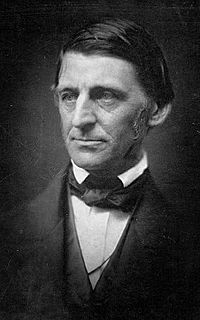
Ralph Waldo Emerson was an American essayist, lecturer, philosopher, and poet who led the transcendentalist movement of the mid-19th century. He was seen as a champion of individualism and a prescient critic of the countervailing pressures of society, and he disseminated his thoughts through dozens of published essays and more than 1,500 public lectures across the United States.
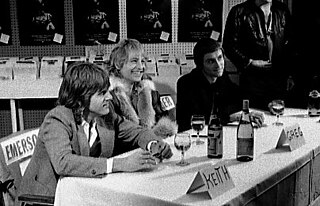
Emerson, Lake & Palmer (ELP) were an English progressive rock supergroup formed in London in 1970. The band consisted of keyboardist Keith Emerson; singer, bassist, guitarist and producer Greg Lake; and drummer and percussionist Carl Palmer. With nine RIAA-certified gold record albums in the US, and an estimated 48 million records sold worldwide, they were one of the most popular and commercially successful progressive rock bands in the 1970s, with a musical sound including adaptations of classical music with jazz and symphonic rock elements, dominated by Emerson's flamboyant use of the Hammond organ, Moog synthesizer, and piano.
Transcendentalism is a philosophical movement that developed in the late 1820s and 1830s in the eastern United States. It arose as a reaction, to protest against the general state of intellectualism and spirituality at the time. The doctrine of the Unitarian church as taught at Harvard Divinity School was of particular interest.
Frank Collins Emerson was the 15th Governor of the US state of Wyoming from January 3, 1927 until his death on February 18, 1931.

Emerson Hough (1857–1923) was an American author best known for writing western stories and historical novels.
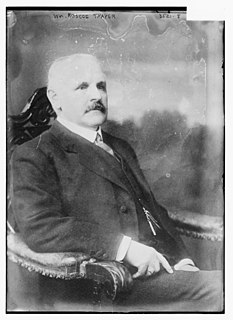
William Roscoe Thayer was an American author and editor who wrote about Italian history.
Alonzo Monroe Clark was an American politician who was the 16th Governor of Wyoming from 1931 to 1933.

Charles Wentworth Upham was a U.S. Representative from Massachusetts. Upham was also a member, and President of the Massachusetts State Senate, the 7th Mayor of Salem, Massachusetts, and twice a member of the Massachusetts State House of Representatives. Upham was the cousin of George Baxter Upham and Jabez Upham.
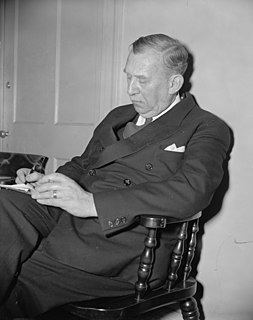
Walter Willis Granger was an American vertebrate paleontologist who participated in important fossil explorations in the United States, Egypt, China and Mongolia.

George Pope Morris was an American editor, poet, and songwriter.
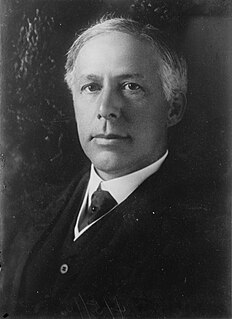
Willis Van Devanter was an American lawyer who served as an Associate Justice of the Supreme Court of the United States from 1911 to 1937.

Louise Emerson Ronnebeck was an American painter best known for her murals executed for the Works Progress Administration (WPA). Born in Philadelphia she married artist Arnold Ronnebeck (1885–1947) in 1926 and they settled in Denver, Colorado. In Denver she built a successful career documenting western American history and social issues of the 1930s and 1940s.
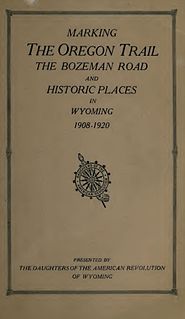
The following works deal with the cultural, political, economic, military, biographical and geologic history of pre-territorial Wyoming, Wyoming Territory and the State of Wyoming.

The following works deal with the cultural, political, economic, military, biographical and geologic history of pre-territorial Idaho, Idaho Territory and the State of Idaho.

The Ferris-Haggerty Mine Site was one of the richest components of the Grand Encampment Mining District in Carbon County, Wyoming. The site was first exploited by Ed Haggerty, a prospector from Whitehaven, England, in 1897 when he established the Rudefeha Mine that would later be known as the Ferris-Haggerty Mine on a rich deposit of copper ore. Haggerty was backed by George Ferris and other investors, of whom all but Ferris dropped out. The partners sold an interest to Willis George Emerson, who raised investment funding for improvements to the mine. These facilities included an engineering feat of its' day by developing a 16-mile (26 km) aerial tramway to carry high grade copper mined at the Ferris-Haggerty Mine (FHM) over the Continental Divide to the smelter in Encampment. The tramway was longest aerial tramway the world had ever seen. The mine was eventually acquired by the North American Copper Company for $1 million. By 1904 the mine had produced $1.4 million in copper ore, and was sold to the Penn-Wyoming Copper Company. However, even with copper prices peaking in 1907, the company had difficulty making a profit from the remote mine site. The company was over-capitalized and under-insured and was suffered devastating fires at the mine site in March 1906 and May 1907 which halted production. Business disputes and a fall in copper prices prevented re-opening of the mine even after it was rebuilt. Machinery was salvaged after a foreclosure in 1913. A total of 23 million pounds of copper ore was extracted from the mine during its life.

The Boston Wyoming Smelter Site was the site of a copper smelter that processed ores from the nearby Grand Encampment Mining District in Carbon County, Wyoming in the early 20th century. The site includes the former town of Rudefeha and is near Encampment, Wyoming. The smelter was constructed in 1902 by Grand Encampment promoter Willis George Emerson, connected to the main Ferris-Haggerty Mine location by a 16-mile (26 km) aerial tram over the Continental Divide. The smelter initially produced matte, an intermediate product in copper refining. In 1903 it was upgraded to produce blister copper. Power for the blowers needed for the blister refining process came from a water turbine at the end of a 4-foot (1.2 m) diameter wood-stave pipe from the South Fork of the Encampment River, 4 miles (6.4 km) away. The smelter could process 300 to 400 tons of ore a day.

The Willis House is a historic residence in Encampment, Wyoming, United States, that is listed on the National Register of Historic Places.
George Willis Cooke was a Unitarian minister, writer, editor, and lecturer. He is best known for Unitarianism in America, his history of that movement in the 19th century, and for his work on Transcendentalist writers and publications.

Wyoming Mail is a 1950 American Western film directed by Reginald Le Borg and written by Harry Essex and Leonard Lee. The film stars Stephen McNally, Alexis Smith, Howard Da Silva, Ed Begley, Dan Riss and Roy Roberts. The film was released on October 18, 1950, by Universal Pictures.

















